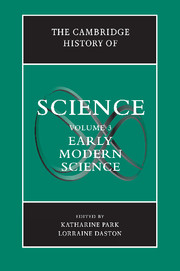
-
Select format
-
- Publisher:
- Cambridge University Press
- Publication date:
- 28 March 2008
- 03 July 2006
- ISBN:
- 9781139054010
- 9780521572446
- 9781107553668
- Dimensions:
- (228 x 152 mm)
- Weight & Pages:
- 1.34kg, 894 Pages
- Dimensions:
- (229 x 152 mm)
- Weight & Pages:
- 1.32kg, 894 Pages
You may already have access via personal or institutional login
Book description
This book provides a comprehensive account of knowledge of the natural world in Europe, c.1500–1700. Often referred to as the Scientific Revolution, this period saw major transformations in fields as diverse as anatomy and astronomy, natural history and mathematics. Articles by leading specialists describe in clear, accessible prose supplemented by extensive bibliographies, how new ideas, discoveries, and institutions shaped the ways in which nature came to be studied, understood, and used. Part I frames the study of 'The New Nature' in the sixteenth and seventeenth centuries. Part II surveys the 'Personae and Sites of Natural Knowledge'. Part III treats the study of nature by discipline, following the classification of the sciences current in early modern Europe. Part IV takes up the implications of the new natural knowledge for religion, literature, art, gender, and European identity.
Reviews
'Undoubtedly this hefty volume is a necessary addition to the libraries of early modern scholars and to the bibliography of any course covering science in the early modern period.’
Source: British Journal for the History of Science
Contents
Metrics
Altmetric attention score
Full text views
Full text views help Loading metrics...
Loading metrics...
* Views captured on Cambridge Core between #date#. This data will be updated every 24 hours.
Usage data cannot currently be displayed.
Accessibility standard: Unknown
Why this information is here
This section outlines the accessibility features of this content - including support for screen readers, full keyboard navigation and high-contrast display options. This may not be relevant for you.
Accessibility Information
Accessibility compliance for the PDF of this book is currently unknown and may be updated in the future.


